iPhone Review -- Smartphone Round Robin
Ah, the iPhone. For better or worse, the iPhone has become the starting point for many consumers looking to buy a smartphone. In a sense, it's become the standard for everyone to measure themselves against. Because of its position at the forefront of consumer's minds and the fact that it's in everyone's pocket, that's completely fair. But because of Apple's sometimes senseless decisions in dealing with all things iPhone, it leaves the rest of us a little uneasy.
Regardless, the iPhone is undoubtedly a cultural phenomenon and has been ever since it was released in 2007. Apple kicked down the door with the original iPhone, upped the ante with the iPhone 3G, and is continuing to count each and every dollar with the iPhone 3GS. To call it anything but successful is to not give it fair credit; the momentum it continues to hold is simply amazing.
So yes, the iPhone is ridiculously successful but don't think it's all peaches, ponies, and paradise--the iPhone platform is far from perfect. There are issues and shortcomings with the iPhone. Oh yes there are. We'll take a look at everything in the full review below!
Hit the jump to see the iPhone reviewed from an Android Perspective!
A Look at What's Changed
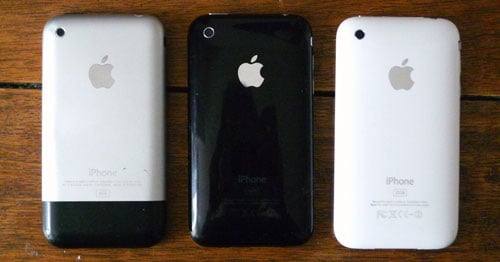
It's funny that for a device that literally changed everything 3 years ago, so little has really changed about the device itself. What made the iPhone originally great has been largely left untouched--the UI, Mobile Safari, iPod--all still great, all still the same.
Even the design of the phone hasn't changed, your eyes aren't fooling you if you think the iPhone 3GS looks exactly like the iPhone 3G because well, it is the same. And to drive in that point, last year's model and this year's model have both maintained the same shape of the original iPhone. Imagine, this is a phone that has been roughly the same (design-wise) for some 3 years now.
So what has changed hardware-wise from last year to this year? Apple has added video recording, a better camera, a crazy fast processor (similar to what's in the Droid), double the hard drive space (from 8GB & 16GB to 16GB & 32GB) and from our point of view, that's about it.
Be an expert in 5 minutes
Get the latest news from Android Central, your trusted companion in the world of Android
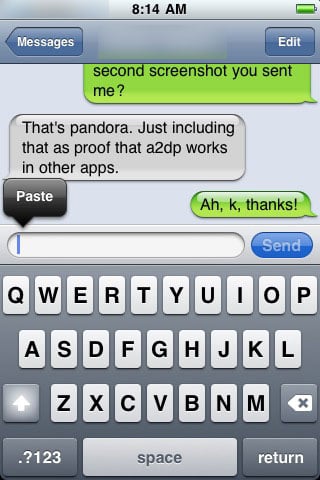
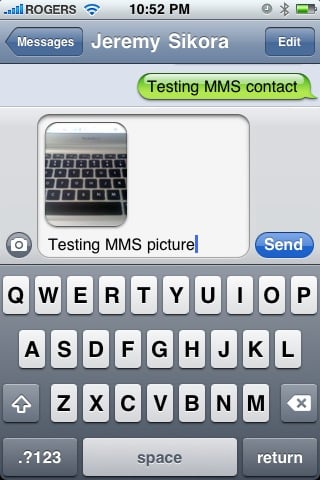
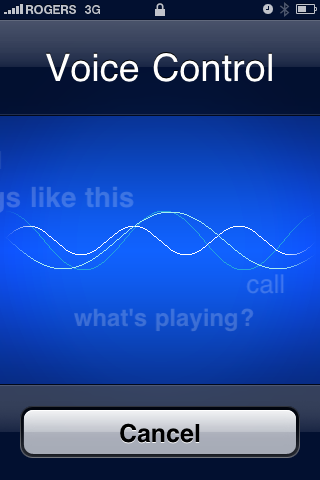
Software speaking, and to be fair, that's what makes the iPhone the iPhone, everything has been finally brought up to speed. iPhone 3.0 hits all the bullet point features of smartphones and introduces some new features of their own. Finally, (finally!) smartphone users all around were placated when Apple finally (finally!) introduced copy & paste, video recording, MMS, voice dialing and all the other commonplace bullet points that the previous iPhones have lacked.
We'll be honest, the iPhone OS is ridiculously fast and stable--in fact, we'd argue that the iPhone 3GS is the performance standard for all powerful smartphones--completely capable of anything you throw at it, speedy in its processes while rarely suffering any breakdown or *gasp* crashes. To call it the gold standard may be painting too rosy of a picture but it's not that far off.
Hardware
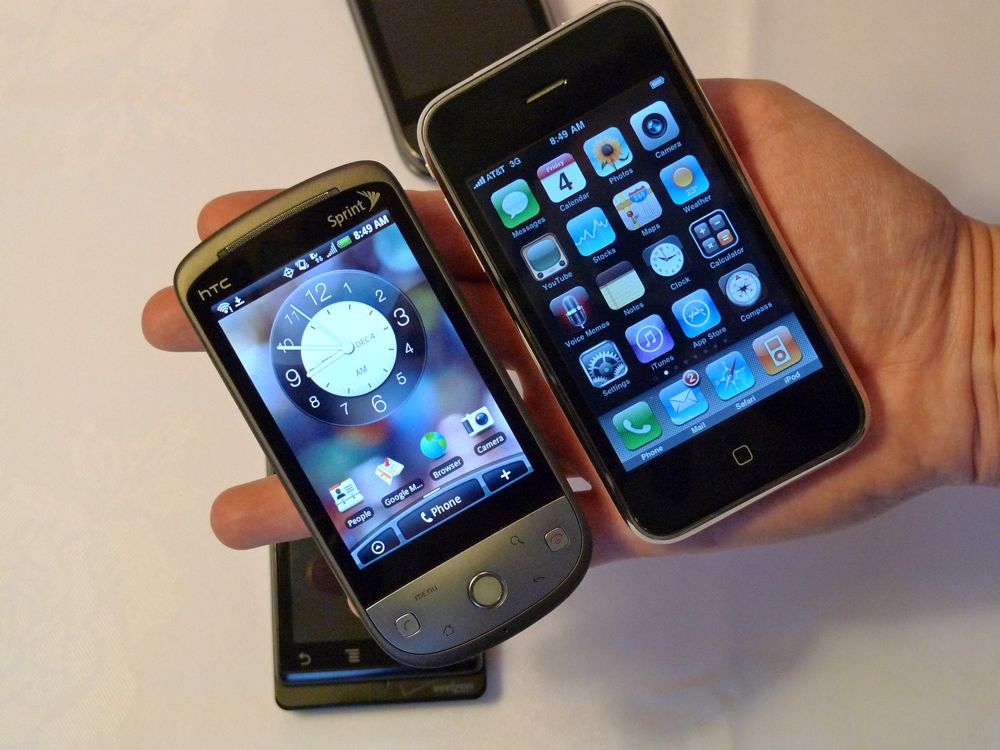
Same familiar front face, same high grade plastic backing. Last year, we gave high praise to the iPhone 3G design because it combined simplicity and great design without being in-your-face about it. It's an iconic design that has helped dramatically change the 'expected' look of a smartphone. And since everyone is pretty much familiar with the styling of the iPhone, we're going to use this space to offer improvements. Yes, though the iPhone is still a wonderfully styled phone, now that it's 2010 there is definite need for improvements.
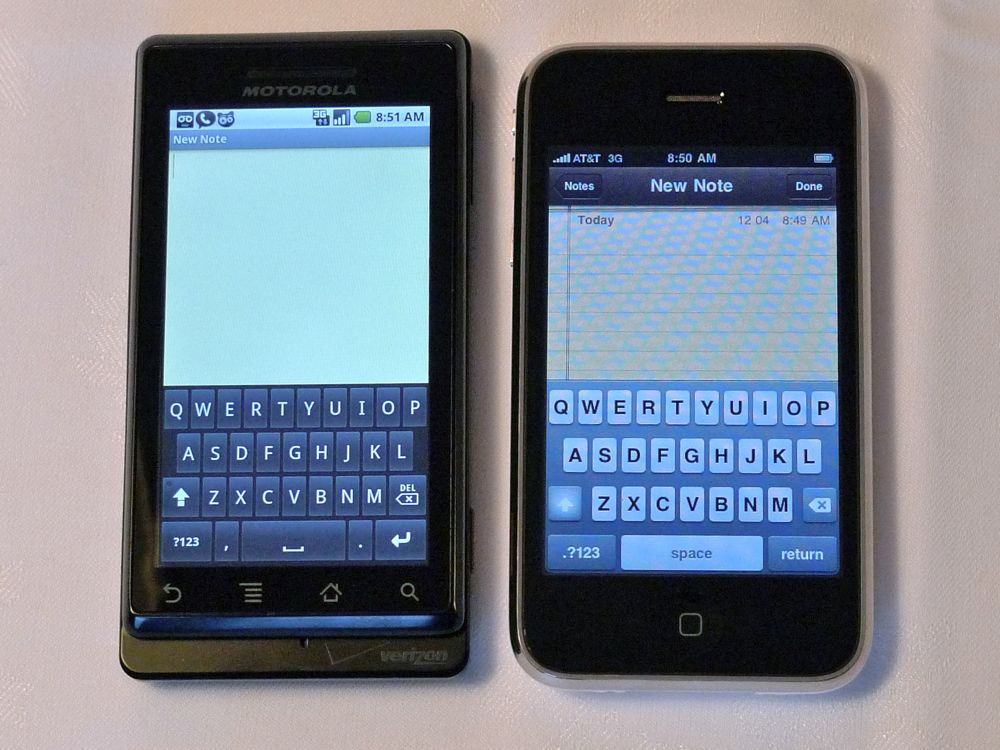
So where can the iPhone 3GS improve? Number one on the list has to be its screen resolution. The iPhone, which was once the standard for screen size and resolution, is now woefully inadequate. Look at the Droid screen or the HD2 screen and you’ll think your iPhone has gone blurry. It’s not even close. The 320x480 resolution is nothing to blink at but 854x480 is where everyone is headed. There are many Android devices that have clearly superior screens than the iPhone's. The next iPhone can't possibly simply stay the course.
Another idea to improve the hardware of the iPhone is to introduce a 'gesture area'. We know it’s not really an ‘Android feature’ but we loved the gesture area from the Pre/Pixi so much that it really makes no sense for the iPhone to not have it. Since Apple refuses to add hard buttons to the iPhone, they should absolutely take advantage of all that empty space next to the home button. A simple ‘back’ gesture would do wonders for the iPhone.
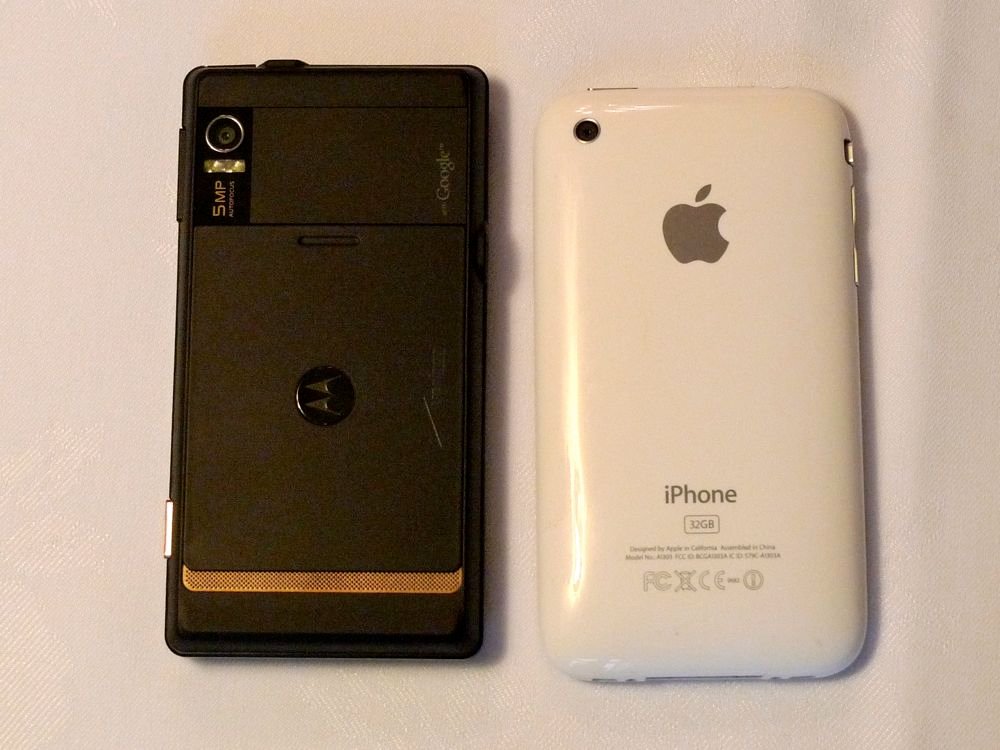
We also wouldn't mind an indicator light--Apple can do this, just look at their MacBook Pro line. Everything else we would complain about seems to be stuff Apple has gone in a different direction with--no flash with the camera, no expandable HD space, no replaceable battery, etc. If you're looking for those features, don't look towards the iPhone.
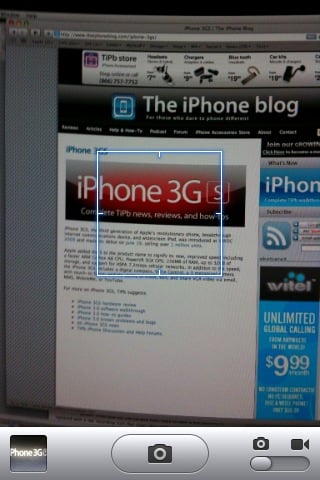
But one thing that Apple gets absolutely right with the iPhone is the camera. The camera now has tap-to-focus which allows for some really great shots. Simply, tap the area you want to focus and it'll re-distribute light and focus to that area (it's really wonderful). The Camera’s UI is clean and intuitive to use, but most important of all, the camera is so much faster than an Android camera. Our Android cameras look good on paper, as in they list flash and high megapixels and sometimes even have a dedicated hardware button, but the iPhone’s camera is clearly superior. It’s not the best camera available on a smartphone but it’s nearly good enough for any day-to-day situation. Video recording is also easy, and quality is great.
What we might be most jealous of though is all that hard drive space, boy, it can make an Android user woozy. You mean you can install as many apps as 16 GB/32 GB will allow you to? There’s no allotted space to max out? Screw expandable storage, I want real, usable storage! With the thousands of apps that are available now on all the platforms, the available space to download apps is the most underrated aspect of a smartphone.
Software
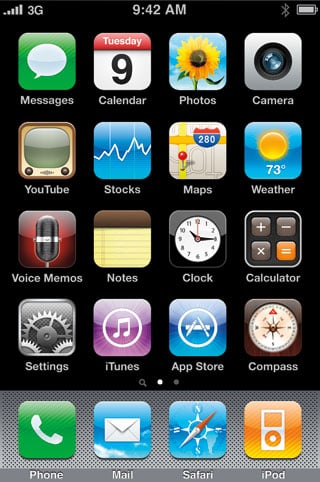
Let's be honest here, there's no other smartphone OS that's as easy to use as the iPhone OS. The iPhone UI is incredibly intuitive and incredibly simple. Being intuitive is always good. Being simple comes with some shortcomings. We've previously made the argument that actions in the iPhone are shallow--buttons are overlaid on the screen, there's no real 'menu' or depth of action--this is good for users who like in-your-face action buttons, but sometimes a menu button is necessary for deeper fields of action. You can't solve everything on one page.
As Android has matured, whenever I use the iPhone, I almost cry about the lack of customization. Sure, you can move apps around wherever you want and maybe change your lock screen wallpaper, but hey, that's about it. With Android you can add widgets that are customized to your liking, shortcuts that can directly do whatever action you want, adjust your settings however you like, and do even more with apps like Locale. With HTC Sense, you even have the ability to completely overhaul your phone with the press of a button!
I don't know what Apple can do, but they've rendered their homescreen experience (and it's a reach just calling it that) to the point where it's merely an application launcher. Maybe I'm too used to the Android way of things but can you imagine if the Android homescreen was simply just the app drawer? Wouldn't that be such a sad, sad sight? Maybe Apple can add the option to hide less-used applications for only searchable purposes, or maybe they can make their icons 'live' to offer important nuggets of data, I don't know, I just know I miss my homescreen.
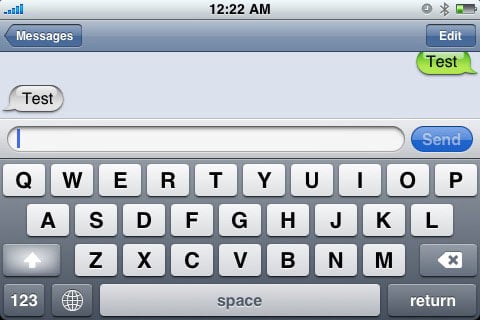
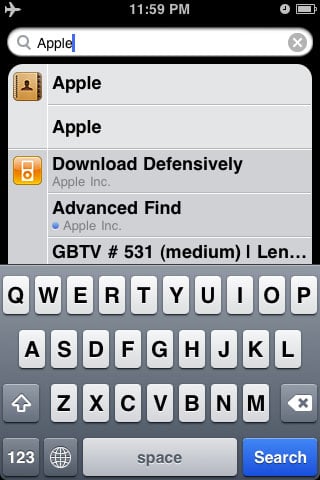
You can't just not customize the homescreen, you can barely customize the overall user experience. For example, I detest landscape mode--in browsing, in typing, in anything--with Android it's simply a checkbox in the settings to turn it off, with the iPhone there's absolutely no way to turn it off systemwide. You also can't even easily turn on/off Wi-Fi or Bluetooth, you need to go into settings to get it right. The universal search in the iPhone is incredibly useful but it lacks web searches, a biggie for a device so closely associated with its internet browsing ability.

The way notifications are handled on the iPhone simply pale in comparison to Android. Notifications either stop your present task and force you to address it right away, or you just become notified of 'something' and have no idea what it is. In short, it's pretty much the worst type of notification possible. When there's detail, it demands immediate action, when there's no detail, you have no idea what to act on. And considering how cool an idea push notifications is, you'd think they'd make the system to handle notifications a lot better.
Fact: the iPhone lacks third party multitasking. That's a huge deal for some users and non-existent for others. The option to do it would be great but exiting and jumping into a new applications on the iPhone is so quick and push notifications is good enough, that it's an almost serviceable workaround (almost). Would I want a way to multitask? Absolutely. Do I miss it immensely when I use an iPhone? Not really, but that's me. If you're deeply invested in multitasking, mark my words, the iPhone 3GS is not for you (but you probably knew that already!).
But let's not get carried away, the iPhone still has some awesome touches in its software--multitouch being chief among them. Multitouch is something we’ve wanted on Android since Android launched without it. Now that we have hardware AND software clearly capable of doing it, it bothers us to no end that we don’t have an official multitouch solution. Yes, there are browsers, hacks, and even Android phones that allow it but come on Google, if it takes your lawyers vs their lawyers, it’s still worth it to make it platform-wide. The user experience in Maps and the Browser is so, so, so much better with multitouch.
Lots of Positives & Problems
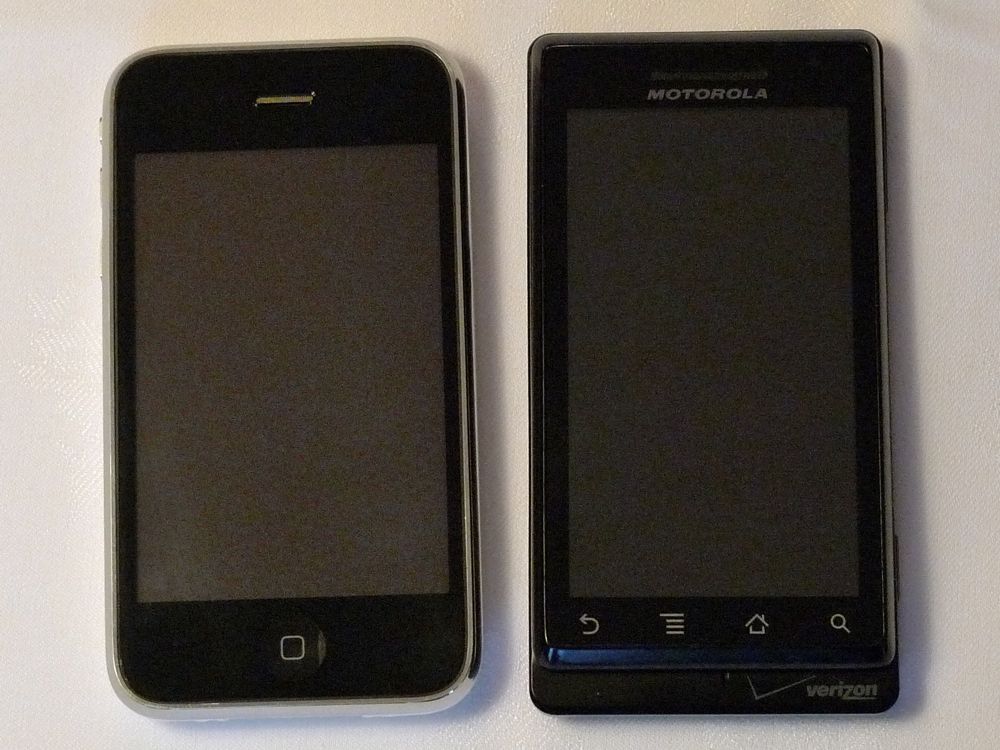
We're on Android 2.0.1 right now, officially. Or is it Android 2.1 with the Nexus One? Or is it Android 1.6 with the G1? Or Android 1.5? Yeah, you get the point. Our OS updates are a mess right now. Apple, having only to deal with one carrier, neatly moves all their users to 3.x in one swift iTunes update. Do I want to plug in my phone to update? Not really, but if that's what it takes to have reliable updates, I'll do it everytime.
And having all their iPhones on the same OS version and their iPhones having the same screen resolutions, there's little to no problem developing applications. You don't need to target a certain OS or screen resolution because it's all standardized. That's a beautiful thing that Android can probably never have because of our varied form factors and OS versions.
But that'll obviously be an issue that Apple will have to address in the future. Like we said before, it's time for Apple to bump the screen resolution and in doing so, will they leave previous iPhone users behind? We'll have to wait and see.

But the big dark cloud hanging over everything that's good and great about the iPhone is that AT&T performance in the US leaves a lot to be desired. And that's really putting it nicely. In bigger and more condense cities like New York or San Francisco, performance is downright awful. Locking themselves onto one carrier handcuffs them. If AT&T doesn't work for you, don't get an iPhone 3GS. Trust us, at the end of the day you want a phone that works first, then works for you second.
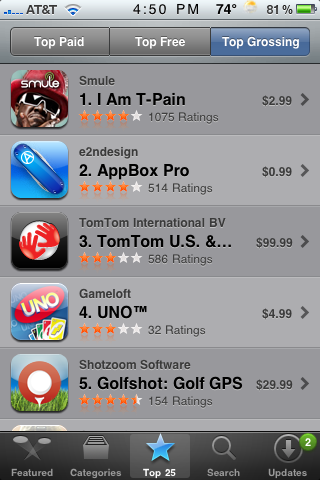
We'd be foolish to forget about the iPhone App Store. Yes, the iPhone and its App Store has a gazillion applications right now and yes there's a lot of awesomeness in there but there's a bit of downside too. Admittedly, the very best iPhone apps certainly outpace applications on other platforms and the game selection on the iPhone is nearly DS/PSP-worthy--the app store is truly amazing. Luckily, us Android folks benefit from the iPhone App Store. How? Because of Apple's app approval process. The highly questionable app approval process (which turned down Google Voice and other apps) is turning off app developers left and right, we're sure developers will jump to Android Market (which only has a bazillion apps rather than a gazillion).
Final Thoughts
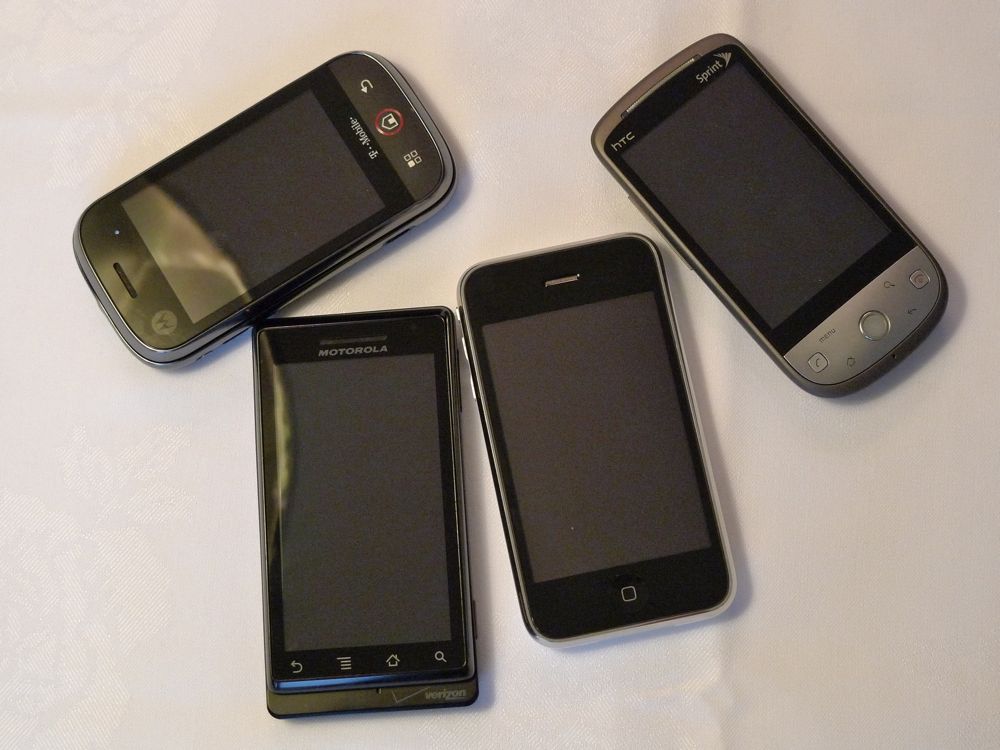
Make no mistake, I'm a huge fan of the iPhone and am sincerely thankful for its introduction some three years ago. It's very likely that I will own one for the rest of my life for its media capabilities alone. If it seems as if I was too tough on the iPhone, it's only because I expect a lot from the platform. But after becoming so familiar with Android, it's hard to go back to a phone, any phone, that can barely handle notifications, can't run widgets and offers very little customization. I want my phone to be mine, not Apple's. Android has simply changed my needs in a smartphone to the point where the iPhone isn't enough anymore. But that's me.
For those of you considering the iPhone? It's a great phone that can pretty much do everything you expect it to and because of 'there's an app for that', it can do more things other phones can't. There's definitely a number of users where the iPhone won't work at all--if you need a physical keyboard, if you need multitasking, if you need a replaceable battery, if AT&T is horrendous in your area--don't get an iPhone 3GS, look somewhere else. But if that doesn't apply to you, get an iPhone, despite my complaints, it's still one of the best options on the market.
Or you can remember that everything the princess phone can't do, Droid does. =) We kid.
Have you listened to this week's Android Central Podcast?
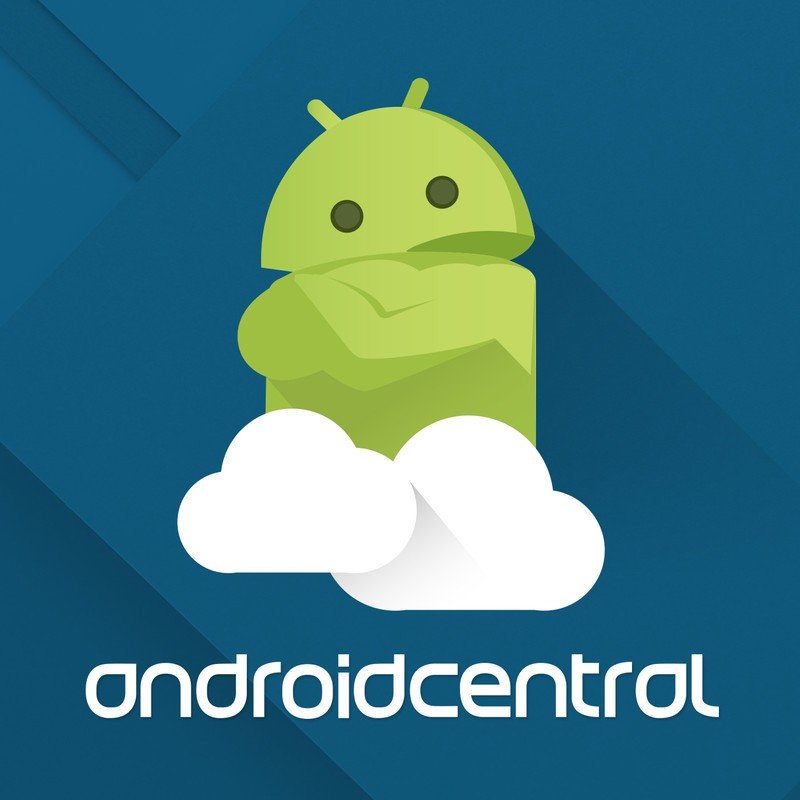
Every week, the Android Central Podcast brings you the latest tech news, analysis and hot takes, with familiar co-hosts and special guests.

